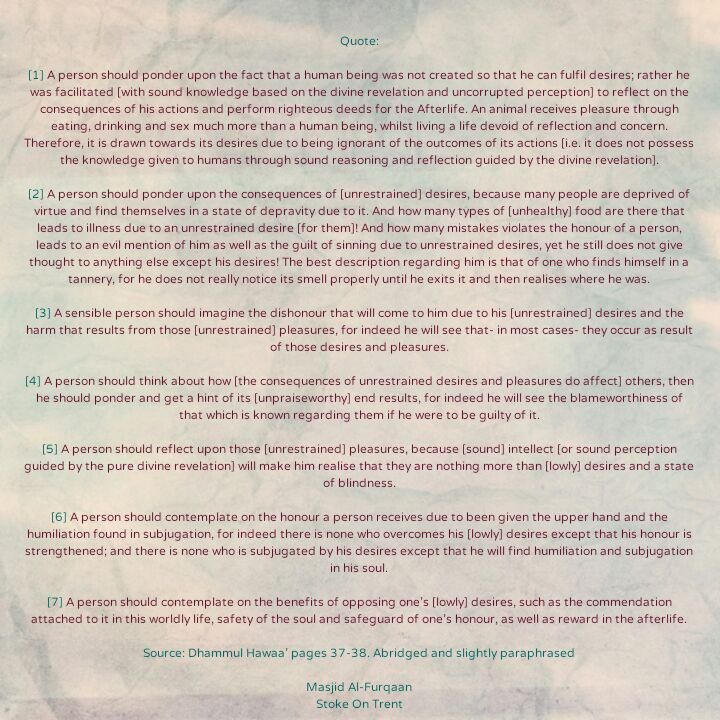
[4] Excerpts from The Dispraise of [Unrestrained] Desires – By Imaam Ibnul Jawzi [Seven Contemplations Regarding Its Evil Outcomes]
In The Name of Allaah, The Most Merciful, The Bestower of Mercy
[1] A person should ponder upon the fact that a human being was not created so that he can fulfil desires; rather he was facilitated [with sound knowledge based on the divine revelation and uncorrupted perception] to reflect on the consequences of his actions and perform righteous deeds for the Afterlife. An animal receives pleasure through eating, drinking and sex much more than a human being, whilst living a life devoid of reflection and concern. Therefore, it is drawn towards its desires due to being ignorant of the outcomes of its actions [i.e. it does not possess the knowledge given to humans through sound reasoning and reflection guided by the divine revelation].
[2] A person should ponder upon the consequences of [unrestrained] desires, because many people are deprived of virtue and find themselves in a state of depravity due to it. And how many types of [unhealthy] food are there that leads to illness due to an unrestrained desire [for them]! And how many mistakes violates the honour of a person, leads to an evil mention of him as well as the guilt of sinning due to unrestrained desires, yet he still does not give thought to anything else except his desires! The best description regarding him is that of one who finds himself in a tannery, for he does not really notice its smell properly until he exits it and then realises where he was.
[3] A sensible person should imagine the dishonour that will come to him due to his [unrestrained] desires and the harm that results from those [unrestrained] pleasures, for indeed he will see that- in most cases- they occur as result of those desires and pleasures.
[4] A person should think about how [the consequences of unrestrained desires and pleasures do affect] others, then he should ponder and get a hint of its [unpraiseworthy] end results, for indeed he will see the blameworthiness of that which is known regarding them if he were to be guilty of it.
[5] A person should reflect upon those [unrestrained] pleasures, because [sound] intellect [or sound perception guided by the pure divine revelation] will make him realise that they are nothing more than [lowly] desires and a state of blindness.
[6] A person should contemplate on the honour a person receives due to been given the upper hand and the humiliation found in subjugation, for indeed there is none who overcomes his [lowly] desires except that his honour is strengthened; and there is none who is subjugated by his desires except that he will find humiliation and subjugation in his soul.
[7] A person should contemplate on the benefits of opposing one’s [lowly] desires, such as the commendation attached to it in this worldly life, safety of the soul and safeguard of one’s honour, as well as reward in the afterlife.
Source: Dhammul Hawaa’ pages 37-38. Abridged and slightly paraphrased
advice, ibaadah, pearls of wisdom, protection, scholars, sins and disobedience, softening the hearts, worship